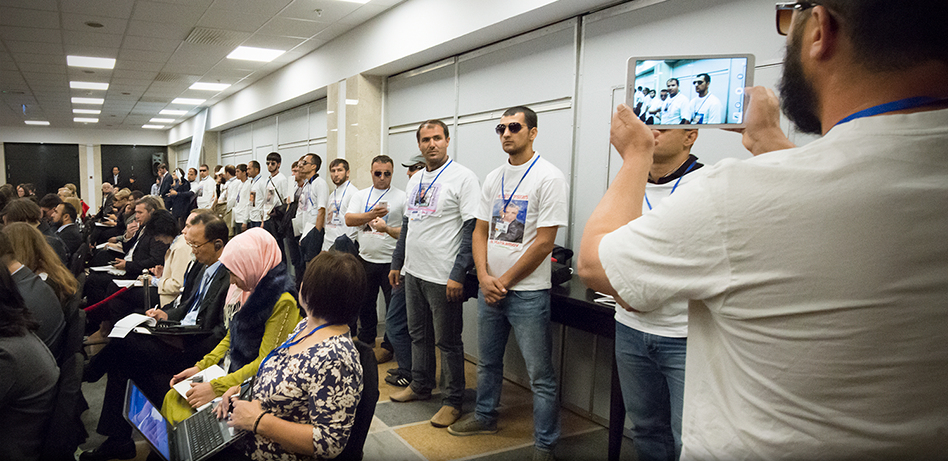The largest annual human rights conference in Europe brought together governments and human rights defenders from 57 countries. The Human Dimension Implementation Meetings (HDIM), which is organized by the Organization for Security and Cooperation in Europe (OSCE), evaluates whether member-states are honoring their human rights commitments, according to agreed-upon standards.
With this goal in mind, human rights defenders at the conference report on recent progress–or lack thereof–in their home country over the past year. However, their role, and the process they support, are under attack. Those who dared criticize their governments in this supposedly protected public forum are now facing harsh persecution at home.
 (Photo courtesy of U.S. Mission to the OSCE)
(Photo courtesy of U.S. Mission to the OSCE)Halfway around the world, in Tajikistan’s capital Dushanbe, members of the protesters’ families were rounded up, arrested, and interrogated. Angry “pro-government” mobs gathered in front of their houses and threatened them. Their children were taunted and threatened at school—some were sent home. By Wednesday the mother of one of the protestors had passed away, her frail health no match for the stress of an arrest and interrogation.
By Friday, the Tajik government delegation left HDIM, foregoing participation in the second half of the conference. Before walking out, they stated that the event had become “too political” and was not serving its purpose.
The Kyrgyz delegation responded much the same to the concerns raised by Kyrgyz defenders. The government publicized photos of human rights defenders sitting next to Kyrgyz opposition party members at HDIM, alleging that they had now joined the opposition, and urging the public to condemn the defenders. On cue mobs gathered in front of their houses to curse and threaten the defenders and their families.
The concerns these delegations expressed echo those of another state whose human rights record is often criticized at the event: Russia. While the OSCE is meant to be a voluntary gathering of states working in partnership on global security, economic development, and human rights, Russia has increasingly attempted to hijack the organization by using the consensus-based decision process to extract special concessions.
Russia’s objections to HDIM have now become a regular part of the decision-making. This year’s annual conference was almost cancelled because Russia spent many additional weeks negotiating for specific topics and wording that suited its desires. The Russian delegation threatened to walk out of the conference if it was “not treated with respect”–which in its view means not being called out for significant human rights violations.
The plenary sessions involving all 57 governments are frequently rife with repartee between the United States and the Russian delegations. The conflict has recently surrounded Russia’s sponsorship of state organized NGOs that support its prioritization of “traditional values” and “stability” over human rights, its annexation of Crimea and the treatment of minority groups there, and its support of separatists in eastern Ukraine’s Donbas region.
HDIM’s organizers expressed great concern about the future of the conference–and the functioning of the institution itself. If Russia continues exerting its power over the organization’s decisions, simply because it seeks to avoid accountability for its human rights violations, then other states that habitually violate human rights will learn from its example, seek to obtain their own concessions, and threaten the entire process.
States that support a strong OSCE that continues to be a standard-bearer for human rights must come together to firm-up the organization’s foundation. This may require some re-tooling; perhaps some basic decisions—such as the fact that a human rights conference will be held every year—no longer need one hundred percent agreement. It may also require a firm stance by a number of states that a transparent and retaliation-free process is required.
At the very least, HDIM should include a larger, protected role for human rights defenders and the organizations that oversee the entire process. The United States is a major player in the organization, and it should lead in identifying a way forward, starting now. Otherwise, the largest annual human rights conference might not happen next year.
Enviroshop is maintained by dedicated NetSys Interactive Inc. owners & employees who generously contribute their time to maintenance & editing, web design, custom programming, & website hosting for Enviroshop.
